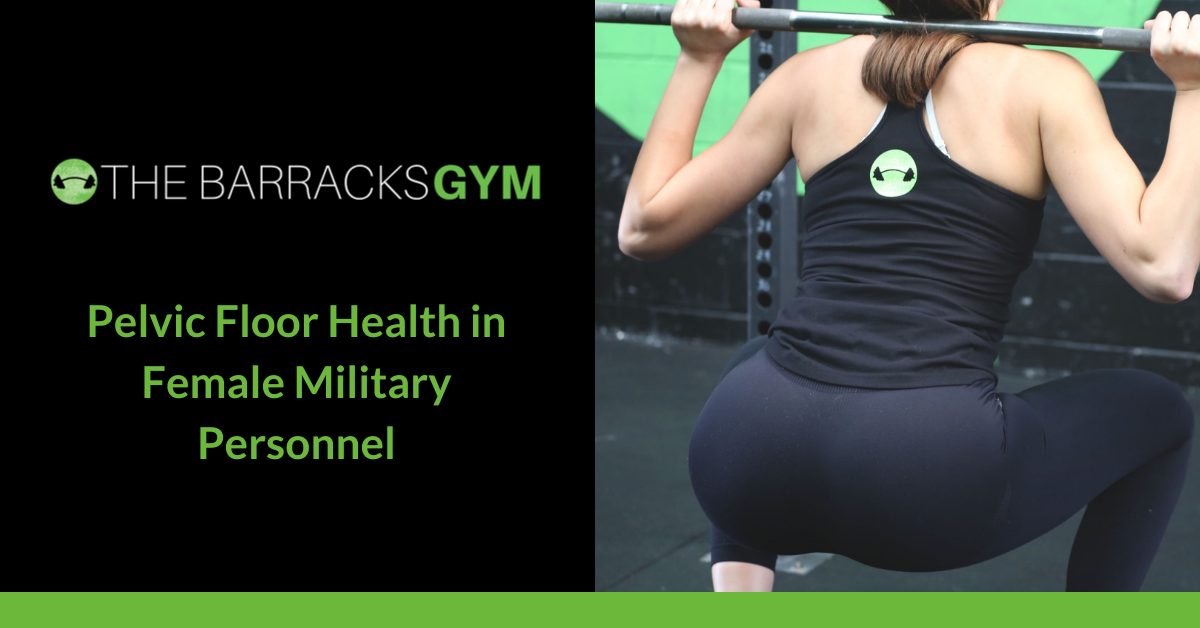|
The pelvic floor is probably not a topic that comes up when you are training for the Physical Fitness Assessment when you want to join the ADF. However, if you're a woman, sooner or later, you'll understand why looking after your pelvic floor should indeed be a crucial element in your workout regime, not just while you're training but also for the rest of your life. In this article, we'll attempt to explain the pelvic floor, its role in your body, and how you can ensure it stays strong and healthy throughout your military career and beyond. What Is The Pelvic Floor The pelvic floor is a group of muscles that form part of the muscular structure commonly called the 'core'. These muscles attach to the pubic bone at the front of the body and the tail bone at the back of the body, forming a hammock-shaped structure at the bottom of your pelvis, providing a strong base. What Do The Pelvic Floor Muscles Do?Together with your deep abdominal, deep back muscles and the diaphragm, the muscles of your pelvic floor play an essential role in stabilising and supporting your spine. The pelvic floor also helps control the pressure in your abdomen during exercise or any activities where you strain yourself, whether that's lifting a barbell, your kid or performing your duties on the job. These muscles also support the uterus, bladder, and bowels, thus play a role in controlling the bladder and bowels when it would be inconvenient for you to visit the toilet. That's also the muscle group that will affect sexual sensation and function. Risk Factors From Having a Weak Pelvic Floor When your pelvic floor is weakened, you will be at risk of developing long-term issues that can significantly affect your quality of life. Urinary Incontinence When the pelvic floor is slack, incontinence of the bladder and bowels is expected as the organs are no longer being supported. This can be uncomfortable, and your pelvic floor allows you to "hold" your need for the toilet. When it's weakening, you can no longer hold on. Pelvic Organ Prolapse Prolapse means that one or more pelvic organs move from their original position and potentially push onto the vagina. Sometimes it has no symptoms at all when it's mild. Other times it can cause a feeling of heaviness, pressure or pelvic pain. Genitourinary Infections Infections may cause discomfort and other uncomfortable symptoms and can really impact the quality of life, even if they are not life-threatening. Acute Pelvic Pain Many women experience pain in their pelvis during their periods or due to other reasons. Still, if suddenly the pain is taking over and there is no explanation for it, you might want to have a pelvic floor physio check that your muscles aren't too tight, weak or overworked. Who Is at Risk of Developing Pelvic Floor Issues? Many factors can weaken your pelvic floor, from childbirth and constipation to persistent heavy lifting and hormone changes in menopause. A recent review paper into the health of the pelvic floor in female military personnel identified athletes and people who do high-intensity workouts as being at higher risk of developing pelvic issues. Sadly, that also means that military servicewomen are also at higher risk. Occupational ChallengesWomen on active duty are often exposed to conditions that can increase UTI occurrence, including decreased access to health care, improper bathrooms, and poor hygiene. These infections can lead to poor pelvic floor fitness. Women in the military also face physical demands that can increase the chances of pelvic organ prolapse due to strenuous activity. Basic and paratrooper training is stressful and joining the military requires high military fitness levels. Some studies show there is a correlation between worsening pelvic support and paratrooper training. It's for these reasons that female fitness in the military has to be of utmost importance. The studies analysed in the review revealed that the prevalence of pelvic floor issues in female military personnel is significant and needs more investigation. Self-Management StrategiesThe studies also reveal that women in the military, especially during deployment, often employ self-management strategies that may have harmful long-term effects. Minimising fluid intake to avoid the frequent need to go to the toilet is one. Holding back on going to the bathroom when they should another. Hormonal birth control to manage period timings is a third. While these strategies might provide short-term help, they can negatively affect work and training performance, not to mention discomfort levels. Another self-management strategy out there is pelvic floor exercises, also known as Kegels. They can be performed regularly for preventive purposes and also to manage mild pelvic floor issues. In some cases, however, you should certainly seek medical help. From a military operation point, proper education of women on these risks and the benefits of pelvic floor muscle training can help women in the military maintain their pelvic floor strength and reduce their risks of developing incontinence and prolapse. Surgery is also an option for those who have previously dealt with prolapsed pelvic organs. Still, the goal is to improve military fitness to avoid these things from happening in the first place. ConclusionImplementing prevention strategies at an organisation level would ensure appropriate care for our servicewomen and optimise the military's performance. Talking about these issues with other military women and communicating your needs to the right departments could ignite this process. In the meantime, the best thing you can do for your pelvic floor health is to keep doing your pelvic floor exercises.
All research is credited to S O’Shea, R Pope, R Orr, K Freire and the team from the Tactical Research Unit at Bond University.
0 Comments
Leave a Reply. |
Most PopularTrusted PartnerWe work with the best service provider for Defence and First Responders.

Get SocialCategoriesArchives
January 2024
|
© COPYRIGHT 2024. ALL RIGHTS RESERVED.


 RSS Feed
RSS Feed